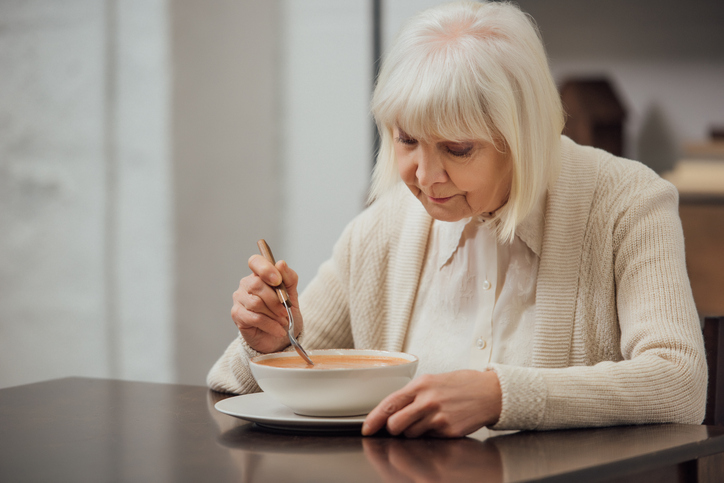
Appetite loss in elderly loved ones can be concerning, but the tips in our latest blog post can help family caregivers understand the issue better.
You’ve just made a big batch of Mom’s legendary chili recipe. Your house smells delectable, and you can’t wait to eat. However, while you’re enjoying not only the flavor but the memories the meal invokes, Mom is simply stirring the food around in her own bowl. And it’s not the first time. Recently her appetite has been diminishing, and it’s beginning to worry you.
What Can Trigger Appetite Loss in Elderly Loved Ones?
Loss of appetite is rather common for many aging adults, for multiple reasons, including:
- A sedentary lifestyle
- Loss of smell or taste that makes food less appealing
- Challenges preparing meals
- Feeling as though they’ve lost control over other aspects of life
- Grief and/or depression
- Loneliness and having no one to share meals with
- Challenges with chewing, swallowing, or self-feeding
- Dehydration
- A routine that doesn’t include regular mealtimes
It is critical to first speak to the person’s doctor and dentist to rule out any medical conditions or medication side effects which may be causing the problem. When it’s confirmed that there is not a medical basis for the change in appetite, try these suggestions to help rebuild the person’s enjoyment in eating and help maintain proper nutrition.
- Provide high-calorie foods in small amounts. As an alternative to three big meals per day, try smaller servings more frequently. You can still prepare larger amounts of favorite meals, dividing them up into individual helpings that can be frozen and reheated. Other foods to try that will supply important nutrients include whole milk, finely chopped meat or eggs, yogurt, diced fruit, avocado, peanut butter or other nut butters.
- Include softer options. During the summer when fresh fruit is especially tasty, try blending up some healthy smoothies. Summer is also a great time for ice cream, frozen yogurt, and milkshakes. Make it even more festive and fun by inviting the family over to make their own custom treats and enjoying them outdoors together.
- Create a schedule. As opposed to waiting until the person says they’re hungry, set designated times each day and adhere to a routine for eating. It could take some trial and error to find the best routine, but give the new schedule some time to work before fine-tuning. Be sure the person’s routine includes plenty of exercise and physical activity as well, which helps to increase appetite.
- Adapt foods and utensils accordingly. If self-feeding is difficult, there are a number of adaptive utensils to explore. You can also make mealtimes easier by serving food that is cut into small, bite-size portions, as well as finger foods including string cheese, chicken tenders, fish sticks, sandwiches, etc.
Home With You Senior Care is here to help manage appetite loss in elderly loved ones. We can prepare nutritious meals and snacks, provide motivation to stay physically active, and offer friendly companionship during mealtime to make it more pleasurable. Give us a call at 410-756-0959 or contact us online to learn more about how our home care services can help someone you know in Owings Mills, Columbia, Stevenson and other nearby communities in central Maryland.
